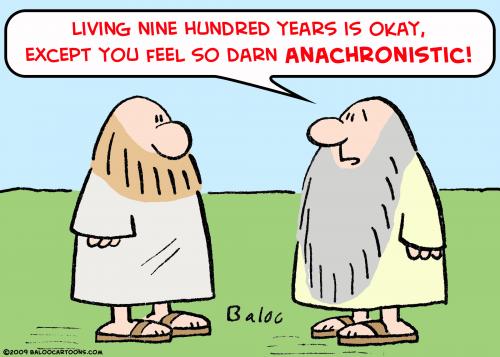What it literally says: We are given the linage from Adam to Noah (or rather from God to Noah), each son's age at their first born child then at their death.
What it says to me: At face value, chapter five is pretty straight forward: Dudes back then were old! Adam lived to be 930, Seth 912, Jared 962, Methuselah takes the cake at 969, etc. Plus, these guys were having kids well past their 100s! But if the ages are to be believed, how in the world did people live so long? When we ask that question, things tend not to be so straight forward as we first thought.
I did a Google search for "how did people in the Bible live so long?" With that question the flood gates open up ... literally ... the great flood and Noah's ark play a huge factor in the trend of human age. Look below:
Age dramatically drops after Noah's ripe old age of 950 (I read ahead, it's in 9:29). Why? Well, going back to the search page, several answers are postulated ... nothing that can be proven, of course. Gleaning from perusing the various web pages, here is what I think sounds the most logical.
The first humans were pretty genetically pure. Heck, Adam had to have had the most pristine genetic code of all. Once Adam and Eve hit the curb, well, their punishment became our normality. Each new child began to affect our gene pool ever so slightly, but unnoticeable because people were still hitting just below 1000. Vegetation was clean, the air was unpolluted, the earth was in its cleanest, most virginal state.
But then, like always, man is just stupid.
We make God so angry with our living that His only recourse is to flood the planet. But lucky, holy ole Noah and his family, however are spared, giving humanity a second chance. Once they start reforming the population again, the average age (illustrated by the individual patriarchs in the graph above; this doesn't necessarily represent the general population as far as I know) plummets over the next few names. Why?
Life was different after the flood, to say the least. If the waters covered the entire planet then that would certainly change the physics and chemistry of the world, that is, if God decided not to intervene in the effects. (It seems He didn't because our old age today is only youth compared to the earliest patriarchs) So, now we have a huge environmental, physical, chemical, traumatic change to the world that probably affects the sun, UV rays, the flora and fauna, oxygen levels, you name it! And if Noah's family are the only one's left ... let's just say any defects were kept in the family.
Once again I take my non-scholarly stance and can't prove any of these flat-out guesses. It sounds logical, though.
Our lives are so configured for our 70-odd years on this earth that I think I'd go nut-so if I had 900 more years to live. It would make me regret not starting a retirement plan when I graduated from pre-school.
And in case you missed it, the patriarch Enoch (not Cain's first born, but an Enoch on Adam's side) didn't die. "Enoch walked with God 300 years ... then he was no more, because God took him away" (22, 24). I wonder how often God did this. Does He do it still? Hmm ...
Here are some sources if you're interested in some more Old-Age-Theories:


WOW! That timeline is crazy. So interesting, babe. Makes sense.
ReplyDeleteDoesn't it? And the the article the graph is from is a really cool read!
ReplyDelete